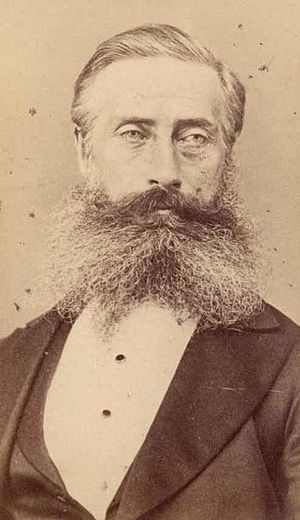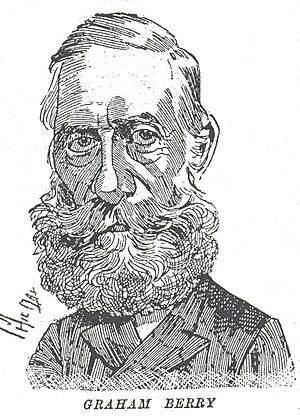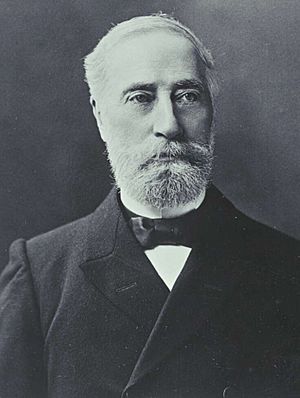Graham Berry facts for kids
Quick facts for kids
Sir Graham Berry
|
|
|---|---|
 |
|
| 11th Premier of Victoria | |
| In office 7 August 1875 – 20 October 1875 |
|
| Constituency | Geelong West (1869–77) |
| Preceded by | George Kerferd |
| Succeeded by | James McCulloch |
| In office 21 May 1877 – 5 March 1880 |
|
| Preceded by | James McCulloch |
| Succeeded by | James Service |
| Constituency | Geelong (1877–86) |
| In office 3 August 1880 – 9 July 1881 |
|
| Preceded by | James Service |
| Succeeded by | Bryan O'Loghlen |
| Constituency | Geelong |
| 7th Speaker of the Victorian Legislative Assembly | |
| In office 4 October 1894 – September 1897 |
|
| Preceded by | Thomas Bent |
| Succeeded by | Francis Mason |
| Personal details | |
| Born | 28 August 1822 London, England |
| Died | 25 January 1904 (aged 81) Victoria, Australia |
| Nationality | British subject |
| Spouse(s) | Harriet Ann Bencowe and Rebecca Evans |
Sir Graham Berry, KCMG (born August 28, 1822 – died January 25, 1904), was an important Australian politician. He served three times as the Premier of Victoria, which is like being the leader of the state government. He was known for his strong ideas and tried hard to change how power was shared in Victoria. He wanted to reduce the power of the Victorian Legislative Council, which was mostly controlled by wealthy landowners.
Contents
Early Life and Moving to Australia
Berry was born in Twickenham, near London, England. He went to school until he was 11 years old, then became an apprentice in a fabric shop. In 1848, he married Harriet Ann Blencowe, and they had eleven children together.
In 1852, Berry moved to Victoria, Australia. He started a business as a grocer and then a general store owner. Victoria's economy was growing fast, and Berry's business skills helped him become wealthy. After his first wife passed away, he married Rebekah Evans in 1871, and they had seven more children.
Even though he missed out on a lot of schooling in England, Berry read many books in Victoria. He taught himself about economics, literature, and philosophy. People often noticed his strong London accent, which some found funny. He became a powerful speaker, much like his hero Gladstone. Even his rivals admitted that his speeches were "passionate" and effective.
Starting a Political Career
Berry was elected to the Victorian Legislative Assembly (the main law-making body) for East Melbourne in 1861. He was seen as a very liberal politician, meaning he wanted more changes and fairness for ordinary people. Later that year, he moved to represent Collingwood, which was known as a very progressive area.
In 1866, Berry moved to Geelong and started his own newspaper, the Geelong Register. He used his newspaper to share his ideas and was elected to represent Geelong West in 1869. He later represented Geelong until 1886. He briefly served as the Treasurer (in charge of money) in 1870 and again from 1871 to 1872. He believed in protectionism, which meant putting taxes on imported goods to help local businesses grow.
Becoming Premier of Victoria
After some conservative governments, Berry became Premier and Treasurer in August 1875. However, his government didn't last long, and he resigned in October of the same year. He then campaigned across Victoria, and in May 1877, with strong support from The Age newspaper, he won a huge majority of votes. He returned to office as Premier, leading a government with many new and bold ideas.
Berry wanted to introduce a new land tax to break up the large properties owned by a small group of wealthy landowners. He also wanted high taxes on imported goods to help local factories. He warned that if the Legislative Council (the upper house of Parliament, elected by wealthy people) blocked his plans, he would "deal with" them. This made some conservatives worried about big changes.
Berry was a strong believer in the rules of government and didn't plan anything illegal. However, the Council was worried enough to pass a slightly changed version of his land tax bill. Next, Berry introduced a bill to pay members of the Assembly, which was important so that ordinary working people could afford to become politicians. He attached this bill to the main budget bill, meaning the Council couldn't reject it without stopping all government money. The Council refused to pass it, leading to a major disagreement.
With the two parts of Parliament stuck, Berry started a public campaign against the Council. On January 8, 1878, known as "Black Wednesday", Berry's government began firing public workers, including police and judges. He argued that without the budget bill, they couldn't be paid. Berry then tried to pass a bill to take away the Council's powers, but the Council rejected it, of course.
For the next two years, Berry stayed in power while Victoria faced a lot of conflict between different social classes. There were huge public marches supporting or opposing Berry. Very few laws were passed, and the government struggled as money ran out. Berry even tried to pass a law saying that money bills didn't need the Council's approval. This was overturned by the British government, and the Governor who approved it was recalled.
Eventually, a compromise was reached. The bill to pay members of the Assembly was passed, and the fired public workers got their jobs back. Berry then tried to reduce the Council's powers again. When this failed, he went to London in 1879 to ask the British government to change Victoria's Constitution. However, the British government refused his requests.
Berry returned to Melbourne, still popular with many, but his government's support was weakening. He tried one more time to change the Constitution, but it failed. He resigned, and his party narrowly lost the next election. After a short period of conservative government, Berry returned as Premier in 1880. This time, his government was more moderate. In 1881, a small reform bill was passed, making some changes to Council elections but not reducing their main powers. Berry resigned, feeling he had done all he could.
Later Years and Retirement
In 1886, Berry left Parliament and became Victoria's Agent-General in London. This was a very important job, representing Victoria in Britain. He was also honored with the title Knight Commander of the Order of St Michael and St George (K.C.M.G.), becoming Sir Graham Berry. He was seen as a hero by liberals in London. He also received awards from the French and Italian governments for his work at international exhibitions.
Even at 70 years old, Berry wasn't done with politics. He returned to Melbourne in 1892, during a tough economic time for Victoria. He was elected to Parliament again and served as Treasurer. In October 1894, he was elected Speaker of the Legislative Assembly, a role he held until he finally retired in September 1897.
Parliament gave Berry a pension, and he spent the rest of his life supporting the idea of Australian Federation, which meant uniting the different Australian colonies into one country. In 1897, he was chosen as a delegate for Victoria at the convention that wrote the Australian Constitution. He was 75 and too frail to do much, but his presence was important as a respected figure. He passed away in St Kilda in 1904 and was given a state funeral.
The Age newspaper wrote that Sir Graham Berry had faced many challenges but lived to see most of his important reforms succeed. While the Legislative Council kept its power for a long time, Berry is remembered as one of the most determined and radical politicians in 19th-century Victoria.
In Movies
Sir Graham Berry appears as a small character in the 2003 film Ned Kelly. He is played by Australian actor Charles Tingwell. In the movie, Berry reads a famous letter from Ned Kelly, but in real life, the letter was not sent to him.
 | James Van Der Zee |
 | Alma Thomas |
 | Ellis Wilson |
 | Margaret Taylor-Burroughs |



